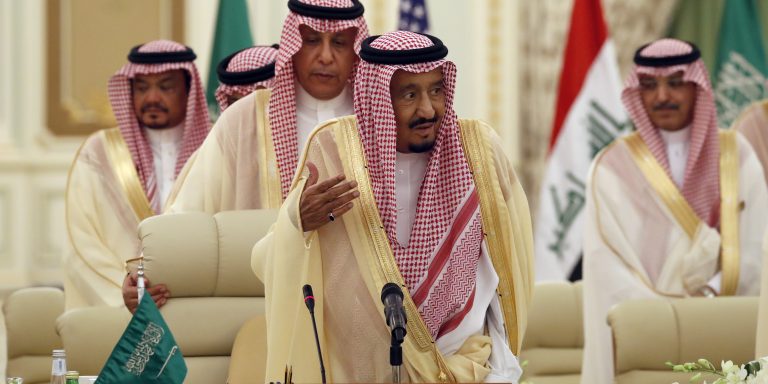INTELBRIEF
November 6, 2017
TSC IntelBrief: Political Upheaval in Saudi Arabia

• The weekend arrests and detention of 11 princes and dozens of wealthy businessmen by Crown Prince Mohammad bin Salman is a major shift in power in Saudi Arabia.
• The Crown Prince has consolidated his power in a way not seen since the founding of the modern-day House of Saud, with checks and balances within the royal family brushed aside.
• The unexpected resignation of Lebanese Prime Minister Sa’ad Hariri, announced from Riyadh November 4, has compounded the sense of a region in turmoil.
• While the Crown Prince seeks some semblance of reform and modernization within the kingdom, foreign policy failures threaten to leave Saudi Arabia stuck in several quagmires of limited benefit.
It’s difficult to fashion a more telling image of the current turmoil in Saudi Arabia than the reported detention of eleven Saudi princes and dozens of leading businessmen in the luxurious Riyadh Ritz-Carlton Hotel. The men are being held, without formal charges or any discernable legal process, by a newly-formed anti-corruption committee led by Crown Prince Mohammad bin Salman (MBS), in a literal gilded cage. The sense of regional instability and disarray was further compounded by the unexpected resignation of Lebanese Prime Minister Sa’ad Hariri, also a Saudi citizen and a member of the same business circle as the men arrested, staged from Riyadh on November 4.
Imagery aside, the arrests are among the most significant changes in decades in one of the world’s most change-phobic countries. Some of the most powerful figures in Saudi Arabia were detained, including Prince Alwaleed bin Talal, a world-famous billionaire investor in companies including Apple and Twitter and Prince Mutaib bin Abdullah, the son of the late Saudi King and head of the very powerful Royal Guard. While both arrests represent political earthquakes in Saudi Arabia, other important figures being held include Usama bin Laden’s oldest brother, head of a well-respected construction firm and totally removed from the terrorism practiced by his infamous sibling.
The news of the mass arrests came shortly after Lebanese Prime Minister Sa’ad Hariri shocked the region by announcing his resignation from office, in a taped address broadcast from Riyadh by the Saudi-owned Al Arabiya TV channel. Riyadh is a long-time patron of both Hariri and his father: former Prime Minister Rafik Hariri, who was assassinated in Beirut in 2005, allegedly by Hizballah. In his address, Sa’ad Hariri claimed he resigned because of threats to his life, a claim that has been rejected by the Lebanese security services. In his pretaped message, Hariri denounced Iranian influence in Lebanon, which has enjoyed almost a year of political stability in a power-sharing arrangement with Hizballah and other parties. The sight of the Lebanese Prime Minister’s resignation, compounded by his message, raised fears that Saudi Arabia intends to extend a struggle with Tehran, which already includes wars in Syria and Yemen, into Lebanon, escalating sectarian tensions.
With the weekend detentions, Crown Prince Prince Mohammad bin Salman has succeeded in controlling all three Saudi security services, while cowing both conservative and reform-minded clerics — an unprecedented consolidation of power in the country’s history. Power had been shared, by design, by family factions descended from sons of the founder of the Saudi dynasty. Dispersing power drastically slowed efforts to effect positive social change in the kingdom, but also kept any one faction from steering it in the direction it preferred. Now that the Crown Prince appears to have won control, he is responsible both for delivering on his promises of reforming Saudi Arabia internally, and for winning its foreign policy struggles, including curbing Iranian influence, the quagmire in Yemen, and the diplomatic spat with Qatar.
The war in Yemen has been a policy disaster for both Saudi Arabia and the United States, which directly supports Saudi involvement. It’s also been a humanitarian disaster for Yemen. After more than two years of fighting, including indiscriminate bombing of civilian targets such as hospitals and schools, Houthi rebels battling the Saudi-led coalition still control the capital and large swathes of the country. The damage inflicted on Yemen, along with a worsening cholera epidemic, make the war increasingly hard for Riyadh and its allies to defend.
The continuing political upheaval in Saudi Arabia can be viewed as a much-needed development for a young country run by corrupt old leaders. Promised reforms, including gains in women’s rights, more government transparency, and even oil giant Saudi Aramco’s pending IPO, most likely wouldn’t have happened with the established royal system that’s been upended. Yet Crown Prince Mohammed’s aggressive regional foreign policy — framed as a black/white battle with Iran and control over the Gulf — has so far been unsuccessful. Foreign policy failures threaten to leave Saudi Arabia stuck in several conflicts of limited benefit to a would-be royal reformer and the nation. For a region craving stability, instability in Saudi Arabia threatens to further exacerbate regional conflicts, fueling sectarianism that could raise the terrorist threat.
.
For tailored research and analysis, please contact: info@thesoufancenter.org
.
.